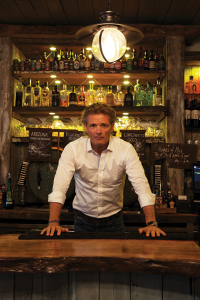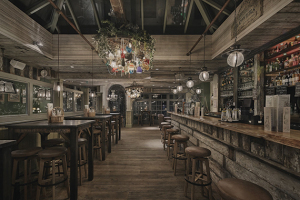 Since opening in May, The Botanist bar on Birmingham’s Temple Street has been making heads turn in a city that has a poor record in attracting quality mid-market operators.
Since opening in May, The Botanist bar on Birmingham’s Temple Street has been making heads turn in a city that has a poor record in attracting quality mid-market operators.
The decision by one of the country’s most respected bar and restaurant groups to invest in an emerging pitch may have surprised many, but it is testament to how perceptions of Birmingham are now changing as a largely untapped, mid-market leisure destination.
Knutsford-based Living Ventures operates 41 bars and restaurants across the country and has created renowned brands such as Living Room, Artisan, Gusto and The Alchemist.
Chief executive Tim Bacon says: “The Botanist’s performance since opening has been absolutely unbelievable.”
The bar is rumoured to be taking about £85,000 a week. “Some weeks it’s doing even better than that,” says Bacon. “We budgeted for less than half of its sales and even then thought we were being optimistic.”
The Australian entrepreneur, who founded Living Ventures back in 1999 with partner Jeremy Roberts, had a taste of Birmingham in the late 1990s and early 2000s. The pair operated bars at Brindleyplace and Broad Street but abandoned the city, claiming trading conditions were just too tough.
“But we never forgot about Birmingham,” says Bacon. “It’s a fantastic city with so much development under way.” When the Temple Street unit became available, Bacon looked again at the second city’s credentials.
Temple Street offers a busy pedestrian thoroughfare linking New Street station and the central business district. It has been largely untapped by leisure operators and after the headaches of operating on Broad Street (the city’s prime leisure pitch), it provided the opportunity to operate in what Bacon describes as “a softer part of town, a nice enclave for a premium casual offer”.
Bacon is enthusiastic about returning to a city he says “is finally getting over its identity crisis. It’s now bold and proud and things are finally starting to happen”.
“In Birmingham, it’s been difficult to know where to put things and there is always the fear you’ll invest a lot of money only to find the market will move and you wind up in the wrong part of town,” he says. “But the council is now talking to people and seems to have a much clearer vision.”
So impressed is the former Australian soap star with what Birmingham has to offer that his group has already identified £7m of further investment in the city.
Living Ventures has purchased the James Brindley pub on the city’s canalside close to Brindleyplace. It is seeking planning to knock the building down and create a 10,000 sq ft building incorporating a Smuggling Cove pub and Alchemist bar, which Bacon hopes to open in spring 2017.
The operator is also about to sign a deal to open a Gusto and Alchemist at Horton Estates’ redevelopment of the former Grand Hotel on Colmore Row. “These are great sites, absolutely prime,” says Bacon. “They are talking about handing the units over in December for openings in spring
or summer next year.”
 Meanwhile, Living Ventures is investigating opportunities to open yet more units across the city centre. As well as continuing to explore possibilities around Temple Street and Colmore Row, it is looking at areas such as Snow Hill and the back of the Bullring.
Meanwhile, Living Ventures is investigating opportunities to open yet more units across the city centre. As well as continuing to explore possibilities around Temple Street and Colmore Row, it is looking at areas such as Snow Hill and the back of the Bullring.
“I can see a place for all our brands across Birmingham,” says Bacon. “It’s just too big a city to ignore.”
In for a penny, in for a pound is a strategy that has served the operator well so far. When Living Ventures moved into Manchester’s Spinningfields in 2010, it ended up opening six units.
“We like to go in heavy,” says Bacon. “We like to create environments by going in with a few at a time to create critical mass. In that way, we do tend to drive the markets in which we operate.”
He adds: “I’d like to open up a couple more units around The Botanist to feast on its success. As long as they are not on one another’s doorstep, we are keen to populate Birmingham with a variety of brands.”
The Living Ventures philosophy is to create a portfolio of brands, but ones that complement rather than compete with one another.
“The target demographics are the same – they just have different faces and attract people at different time s,” says Bacon. “Gusto, for instance, is a premium casual diner, Botanist more of a pub with a wide selection of beers, while The Alchemist is more of a mixed cocktail bar. We cluster them together to create a lifestyle.”
Once Living Ventures establishes itself in a city centre market, its strategy is to expand into affluent outlying centres.
Bacon confirms that the group is actively looking in leafy Edgbaston, where it could well become an integral part of the redevelopment of the suburb’s 1,500-acre Calthorpe Estate.
“We’re also looking in the likes of Solihull, Harbourne, Henley-in-Arden and Leamington Spa, where the demographics sit alongside our brands,” says Bacon.
But what about the potential for other West Midlands centres? When asked about his plans for the likes of Coventry, Wolverhampton and Stoke, Bacon says: “They are not areas we are considering right now. I’ve never been to Coventry and the remit at the moment is Birmingham and the affluent areas that surround it. It’s a strategy that’s worked well for us in the likes of Manchester, Leeds and Liverpool.”
Local agents are not surprised by Living Ventures’ stance. “When we see requirements for London operators wanting to spread their wings, Birmingham is one of the first places they want to come to,” says Fleurets’ Andy Tudor. “The city is streets ahead of other parts of the West Midlands.”
Colliers director Paul Hands agrees, saying: “When you look at operator lists, the likes of Coventry, Wolverhampton and Stoke just don’t appear. It’s all about demographics and finding the right profile for your brands. People will travel a good distance to get into Birmingham and everywhere else is playing catch up.”
There is consensus that Living Ventures’ commitment to Birmingham will provide a welcome boost to a more aspirational leisure market that is still finding its feet.
Tudor refers to the group as “a quality operation that will be very much welcomed in the city,” while Hands says: “Their brands will go down very well. Bacon understands the market. He’s done it all before and what he doesn’t know isn’t worth knowing.”
Meanwhile, Bilfinger GVA’s Alastair Robertson-Dunn says: “Their brand is strong enough that they can create a pitch around them. They are prepared to take the risk and know that if they make the move, others will follow. They will set the strategy for other operators who want to hang on to their coat tails. That’s a pretty compelling position to be in.”
New entrants
Not surprisingly, the most notable new entrants into the region’s mid-market leisure sector have been drawn to Birmingham.
In March, new bar and restaurant Gas Street Social debuted in Birmingham’s Mailbox and in May, Loungers opened its Cosy Club bar at the former banking hall building on Bennetts Hill.
In July, local restaurant group Lasan opened new Indian restaurant concept Nosh & Quaff at 130 Colmore Row.
An array of new leisure operators opened their doors at Birmingham’s £150m Grand Central scheme last month, including Tapas Revolution, Vietnamese restaurant Pho and Italian restaurant Cafe Concerto.
Dubella Lounge, a Sutton Coldfield-based café, bar and restaurant, is soon to open in Birmingham’s Barclaycard Arena.
In July, Nottingham-based Rub Smokehouse & Bar opened at Birmingham’s Regency Wharf, where Karaoke Box is soon to launch its first operation outside of London.
Restaurant chain Bill’s is due to open in Birmingham’s Bullring in December after opening in other local areas, including Leamington Spa.











